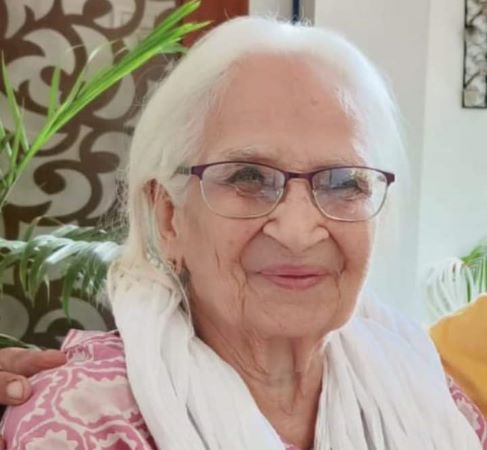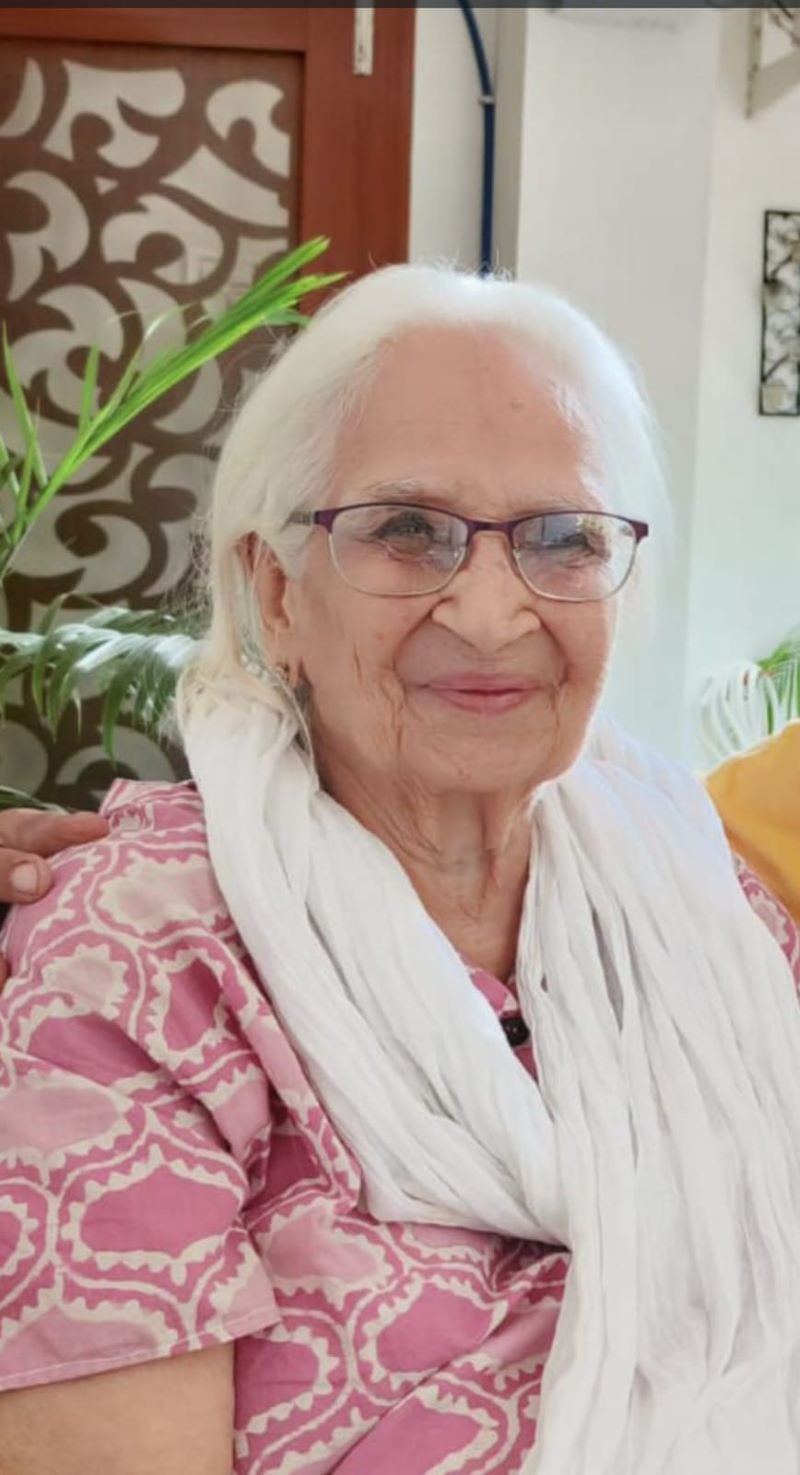
Tara continued to write, and as her style matured, her work continued to explore the lives of ordinary people: their daily stresses, responsibilities and reactions.
Saaz Aggarwal
[Tara Mirchandani, a lovely, gentle soul who won the Sahitya Akademi Award for her novel Hatha Yogi in 1993, passed away on November 8, 2023 at the age of 93. I was privileged to interview her in 2016 when I was working on my book The Amils of Sindh.]
Tara Mirchandani was in her final year of school when she happened to go with her friend, Ishwari Jotwani, to a meeting of the Gandhi Group. The group had students from different schools of Hyderabad, and its purpose was to create awareness about Indian nationalism among young people. They recited poetry and put up drama performances at the Ladies Club situated at the north end of Hirabad. When they performed Umar Marui, Tara played Marui and Ishwari was Umar; In Sohni Mahwal Tara played Sohni, and Ishwari was Mahwal. Ishwari, one year older, was more active in the freedom movement and often joined Kamala Hiranand’s prabhat pheris, and in defiantly hoisting the flag. These were activities of great risk, being punishable by law.
Tara’s writing talent was spotted early and when the weekly magazine Vidyarthi was started, she was selected as the editor. The magazine gave voice to students and one of its aspirations was the demand that Sindh University be established. Tara wrote the editorials for this weekly and this was the start of her long journey of a lifetime of commitment to writing about important issues, which she put on paper with absolute simplicity.
 Tara’s writing talent was spotted early and when the weekly magazine Vidyarthi was started, she was selected as the editor.
Tara’s writing talent was spotted early and when the weekly magazine Vidyarthi was started, she was selected as the editor.
As the troubles preceding Partition began to escalate, Tara’s parents sent her and her brother Chandru (Mirchandani) to Anand in Gujarat where they were given admission in the college by Principal Butani.
Their parents, Dewan Dayaram and Jassibai Mirchandani, were zamindars and could not bear the thought of leaving Sindh. When they realized that there was no other option, they left for Bombay, and Tara and Chandru moved there to stay with their parents.
At Jai Hind College, Tara had morning classes and, like many of the other Partition-affected students, went to work for the rest of the day. As a clerk in the Rehabilitation Finance Department, she earned Rs150 a month, a substantial contribution to the family income. Professor MU Malkani, literary stalwart of Sindh and now a professor at Jai Hind College, was delighted with Tara’s writing abilities and introduced her into the Sindhi Sahit Mandal where writers supported each other with feedback and encouragement.
Tara’s first short story was Surg jo Sair – A Journey to Heaven. One day, she recognized a youngster from an affluent family of Sindh in a Bombay local train. His torn shirt and shorts and the expression on his face as he hawked sweets to passengers haunted her, and she wrote the short story Gopu, a snapshot of a traumatic Partition experience.
Tara herself was finding the commute too tiring and she had to discontinue her studies in favor of her job. When she was twenty, she married Moti, son of the well-known freedom fighter, Ramchand Parumal. In later years, when Moti was ailing, she wrote down his memories of the freedom movement and the traumatic experiences he and his family went through during Partition, an invaluable documentation of an important period of history.
As the troubles preceding Partition began to escalate, Tara’s parents sent her and her brother Chandru to Gujarat. Their parents, Dewan Dayaram and Jassibai Mirchandani, were zamindars and could not bear the thought of leaving Sindh. When they realized that there was no other option, they left for Bombay, and Tara and Chandru moved there to stay with their parents.
Tara continued to write, and as her style matured, her work continued to explore the lives of ordinary people: their daily stresses, responsibilities and reactions. On the page, they emerged through Tara’s own sweet nature and high principles in touching renderings, appealing to readers and with an admirable literary standard.
Her novel Hath Yogi describes the kidnapping of a four-year-old girl, Rama, who is forced to beg on the streets of Banaras. She is rescued by a young college student who gives her shelter and brings her up. At the age of sixteen, Malu finds herself desperately in love with her guardian, but this young man cannot bring himself to acknowledge or reciprocate her feelings as he is duty bound to restore her to her parents. ‘Hath Yogi’ won the Sahitya Akademi Award in 1993.
Tara believed in the goodness of human nature, and her stories carry a strong message for the reader. She always gave credit to her mother, who was religiously inclined and would recite passages from the Ramayana, Mahabharat and Guru Granth Sahib to her children; these soulful renderings kindled in Tara a sensitivity to be able to pour out her feeling with simplicity on paper.
(Excerpted from The Amils of Sindh by Saaz Aggarwal black-and-white fountain (2019)
________________
 Saaz Aggarwal is an independent researcher, writer and artist based in Pune, India. Her body of writing includes biographies, translations, critical reviews and humor columns. Her books are in university libraries around the world, and much of her research contribution in the field of Sindh studies is easily accessible online. Her 2012 Sindh: Stories from a Vanished Homeland is an acknowledged classic.
Saaz Aggarwal is an independent researcher, writer and artist based in Pune, India. Her body of writing includes biographies, translations, critical reviews and humor columns. Her books are in university libraries around the world, and much of her research contribution in the field of Sindh studies is easily accessible online. Her 2012 Sindh: Stories from a Vanished Homeland is an acknowledged classic.
Courtesy: Saaz Aggarwal | Sindh: Stories from a vanished homeland (Posted on November 9, 2023)